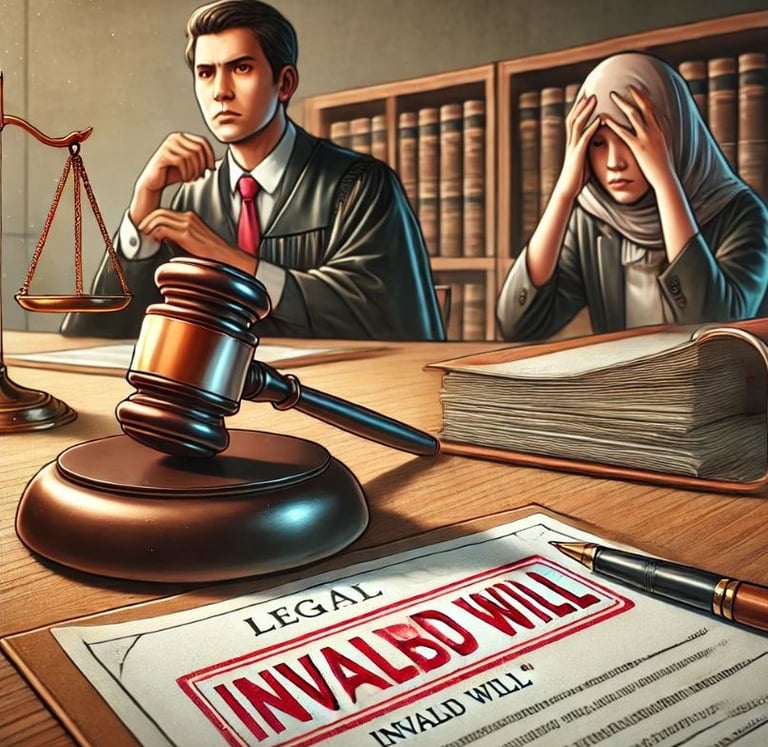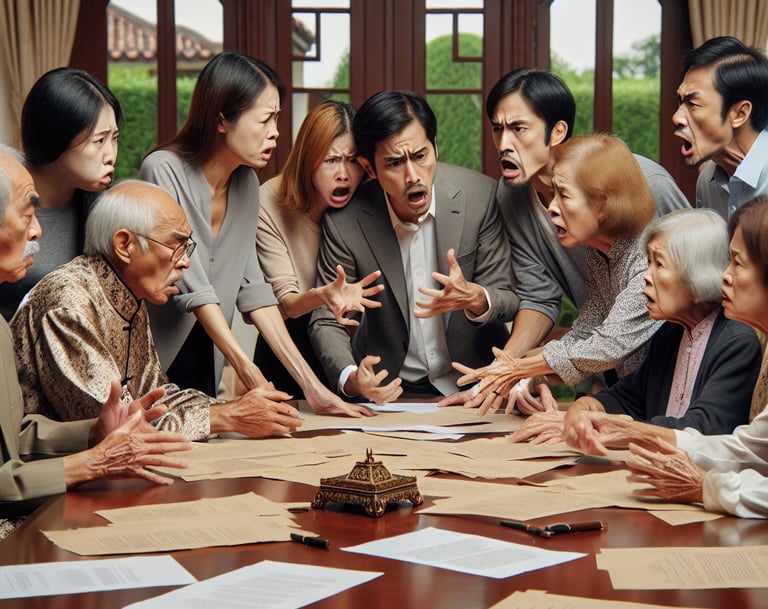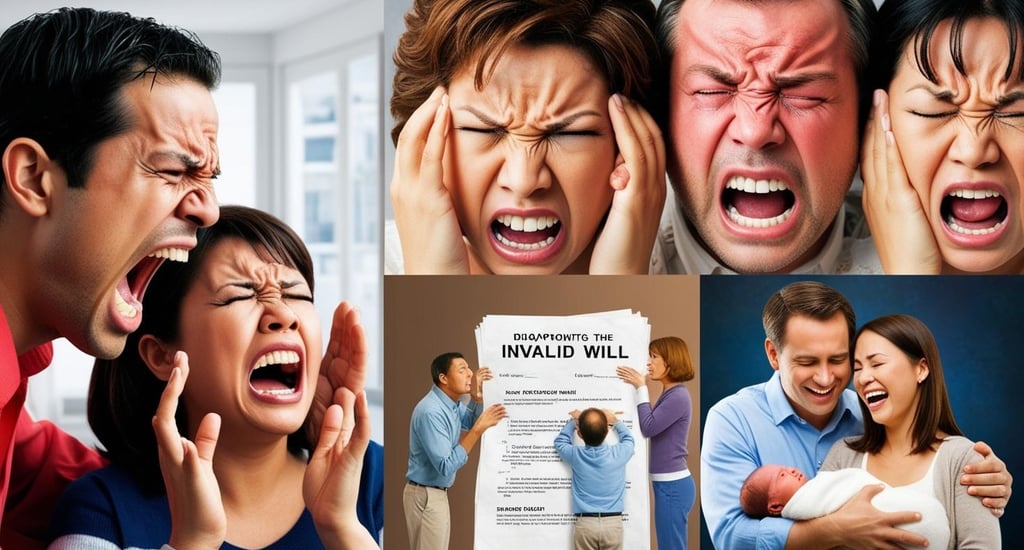📘 FAQS – Everything You Want to Know About Will & Trust Planning
Got questions before writing your will? You’re not alone. Here are the top 20 things Malaysians ask—answered clearly.
Acquisition of a new asset /joint-name asset
Entering into a de facto relationship or purchasing a joint-name asset
Remarriage or divorce
Death of an intended executor, change of executor, or a breakdown of relationship between executor and beneficiaries
Death of a beneficiary
Death of witnesses to the will, difficulty locating both witnesses, or migration to another country
Birth of a new born / new family member (new arrival) you wish to include as a beneficiary
Reallocation of assets to different beneficiaries
Change of mind, intention, or substantial change in your financial situation
Change in a beneficiary’s status (e.g., bankruptcy, comatose state, death, divorce, or missing)
Changes in legislation or laws (such as the introduction of death duties)
Conversion to Islam (which will revoke a non-Muslim's existing will)
special child/single parent/single not marriage/old parent they need trust planning to protect
Consult us or a professional estate planner if any of the following events occur:
(In accordance with Malaysia’s Wills Act 1959 and professional best practices.)






Other circumstances where updating your will is advisable:
Business ownership change:
Buying, selling, or closing a business
Significant debt accumulation:
Large debts that may impact estate distribution
Receiving a major inheritance:
Restructuring your asset allocation after inheritance
Special needs planning:
If a beneficiary becomes disabled and requires a protective trust
Permanent migration:
Moving to another country with different inheritance lawsimportant because some countries have different inheritance rules.
Also consider updating your will and setting up a trust if:
You have a child with special needs requiring long-term financial protection
You are a single parent needing to secure your child’s future
You are unmarried and wish to control the distribution of your assets — and to ensure that someone you trust can manage your affairs and care for you in the event of coma, critical illness, accident, or disappearance
You have elderly parents /family members who depend on you financially
💬 "Tomorrow is never promised — and neither is your outdated will.
Don't leave behind uncertainty. Leave behind clarity, love, and protection.


💡 “Is Your Will Still Valid… or Already Revoked Without You Knowing?


Just because you've written your will once doesn’t mean it’s valid forever. Many Malaysians are shocked to find out that their will can be legally revoked—or ignored—due to life events or legal mistakes.
Let’s break down the most common reasons:
✅ You Made Handwritten Changes on the Will
✍️ Writing directly on your will or adding sticky notes might seem convenient — but it can invalidate the document.
✅ Only a new will or a formal codicil (legal amendment) is acceptable.
🚫 Never DIY your updates — it can cause more harm than good.
✅ Your Beneficiaries or Executor Have Passed Away
☠️ If any of your named people have died or are uncontactable, your will may no longer carry out your wishes.
✅ You’ll need to revise the will to appoint new people and prevent legal gaps.
✅ The Will Is Not Signed or Witnessed Correctly
🖋️ A will must be signed in front of two independent adult witnesses.
If either witness is a beneficiary, their gift can be void.
⚠️ Missing or improper witnessing = challenged or invalid will.
👩⚖️ The Law Says:
“A will must be made in writing and signed by the testator in the presence of two or more witnesses present at the same time...”
— Section 5, Wills Act 1959 (Malaysia)
“Any unauthorised alterations, interlineations or erasures may render the will or parts of it invalid.”
— Legal interpretation by Malaysian probate practitioners
“A simple mistake in your will today could create a lifetime of problems for your family tomorrow.”
📣 Let’s Fix It Together
Not sure if your will is legally valid?
💼 Book a Free Will Review with Melody Lee – Your Trusted Will & Trust Specialist.
📲 Click here / DM to check before it’s too late.
https://wa.me/60168459002
WHAT ACT GOVERNS WILL WRITING IN MALAYSIA?
Wills Act 1959
Probate and Administration Act 1959
Trustee Act 1949
Inheritance (Family Provision) Act 1971
Guardianship of Infant Act 1961
💍 “If You Got Married, Your Will Is No Longer Valid. Here’s Why.”
✅ Learn the law & protect your family before it’s too late.
⚠️⚠️❗ Did You Know?⚠️⚠️
In Malaysia, the moment you get legally married, any previous will you made is automatically revoked — unless your will was made in contemplation of that marriage and explicitly stated so.
💔 What Could Go Wrong?
Your assets may not go to your intended loved ones.
Your parents or siblings might end up fighting with your spouse.
If you pass away without a valid will, the Distribution Act decides who gets what — not you.
👩⚖️ The Law Says:
“A will is revoked by marriage unless it is made in contemplation of that marriage.”
— Wills Act 1959 (Malaysia)
✅ Marriage or Remarriage
Under Malaysian law, marriage automatically revokes your previous will. A new will is required to reflect your updated marital status and protect your spouse.
✅ Divorce or Separation
Your ex may still be named as a beneficiary or executor. If your relationships have changed, so should your will.
✅ New Children or Grandchildren
Include their names and appoint guardians to ensure they are protected if anything happens to you.




💬 "Your marriage begins a new chapter—make sure your will does too."
📞 Call us:
💡 Unsure if your current will is valid after marriage?
📝 Book a FREE Will Check-Up with Melody Lee – Certified Will & Trust Specialist.
📲 DM now or click the link to secure your family’s future.
https://wa.me/60168459002
💡 What You Should Do:
Review your current will — or lack of one.
Create a new will that reflects your current marital status and wishes.
Seek expert help to ensure it’s legally binding and correctly witnessed.
💡 Most-Asked Questions:
Is my will still valid if I move to another country?
It may still apply, but legal enforceability varies. It’s wise to prepare a separate will for overseas assets to ensure clarity and avoid delays.Can I name more than one executor?
Yes, you can appoint multiple executors, and they’ll act jointly unless you state otherwise.Can a beneficiary also be my executor?
Yes. It’s common for a spouse or adult child to be both a beneficiary and an executor in Malaysia.Even though I’ve nominated someone for my EPF/insurance, do I still need to mention them in my will?
Yes, nomination comes first — but stating it clearly in your will ensures no confusion, especially for unclaimed or unmatched funds. It also reflects your full intention and strengthens your estate distribution clarity.5Can I allocate a large insurance payout to be managed through my will — to benefit my children gradually instead of one-time?
Yes, with proper planning, you can set up a testamentary trust in your will. This ensures the insurance proceeds are held and released in stages — e.g., when your children reach age 18, 21, or 25 — giving you better control even after death.What if my will is lost?
If no original or certified copy can be found, it might be presumed revoked. Always store your will with a custodian service or trusted advisor.Can someone contest my will?
Yes, any will can potentially be contested. That’s why engaging a professional planner is crucial — they’ll include protective clauses such as “no-contest”, “bankruptcy exclusion” and clarity on mental capacity to reduce risk.What makes a will invalid?
Common causes include improper witnessing, unsigned pages, handwritten changes, or life events like remarriage without updates.Can I disinherit my spouse or children?
Yes, but it must be done with specific clauses and professional guidance to reduce legal challenges under the Inheritance (Family Provision) Act.What is a trust in a will?
A testamentary trust is built into your will to manage your wealth for children, dependents, or special purposes — especially useful for large insurance payouts or vulnerable beneficiaries.
What happens if my named executor refuses or passes away?
That’s why you must appoint a substitute executor in your will — someone who can step in if the first person is unable or unwilling.How long does it take to execute a will in Malaysia?
Typically 6–12 months, depending on the estate’s complexity, asset location, and clarity of the will’s instructions.Can I use an online template to write my will?
Technically yes, but it’s risky. Templates may not comply with Malaysian law and can leave critical issues unaddressed.Is a will from another country valid in Malaysia?
It depends — if it meets Malaysian requirements, it might work, but it's safer to prepare a local will for local assets.What if I have debts? Will they affect my children’s inheritance?
Yes, debts must be settled before any distribution. Beneficiaries only inherit the balance — not the debts.How do I ensure no one tampers with my will?
Use professional drafting, register it, and store it securely with a trusted will custodian. Inform your executor and key family members of its location.Does Islamic law apply to my will?
Yes, if you're a Muslim, Faraid applies automatically. Wills can only distribute 1/3 of your estate outside of Faraid unless all heirs agree otherwise.Can my business be passed on through my will?
Yes — especially for sole proprietors. For partnerships or companies, further planning like succession agreements is necessary.When is the best time to write or update a will?
Anytime there’s a major life change: marriage, divorce, childbirth, property purchase, or business. Don’t wait — prepare early.What’s the difference between a will and a trust?
A will distributes assets after death. A trust can function during your lifetime and offers more privacy, flexibility, and asset control.




Understanding Our Will Services


When Should I Rewrite or Update My Will?
A will is not a one-time document. It should evolve as your life changes. Many people don’t realize that certain life events can revoke or make your current will outdated—or even invalid.
To ensure your wishes are always legally protected and up-to-date, consider rewriting or reviewing your will if any of these situations apply:
✅ Death of a Beneficiary or Executor
If someone named in your will has passed away, update it to appoint new individuals.
✅ Buying or Selling Property or Assets
Have you purchased real estate, started a business, or invested in new assets? Ensure they are included in your estate plan.
✅ Relocating or Owning Assets Overseas
Property in other countries may not be covered by a Malaysian will. You may need separate wills for different jurisdictions.
✅ Changes in Relationship or Family Dynamics
Family or friendships evolve. Update your beneficiaries or guardians if your trust, priorities, or relationships have shifted.
✅ You Haven’t Reviewed Your Will in 3–5 Years
Even without major life events, it's wise to review your will periodically for accuracy and peace of mind.




Legal Aspects of Will Writing
Estate Planning Clarified
We address common concerns and provide clarity on our will services to help you make informed decisions.
Our FAQs cover legal requirements, service details, and more.
For further assistance, feel free to contact our team.
💡 Top 20 Most-Asked Questions:
Why should I write a will now, not later?
Without a will, your estate may be frozen for years and your family could face delays, costs, and conflicts.What happens if I die without a will in Malaysia?
Your assets will be distributed according to the Distribution Act 1958—not your wishes. The court decides.Is my will valid if I write it myself?
DIY wills can be risky—if not done properly, it may be invalid. A professional ensures legality and clarity.How often should I update my will?
After major life changes: marriage, divorce, new baby, buying property, etc. Ideally, review it every 2–3 years.Can I include overseas assets in my Malaysian will?
Yes—but you may need separate wills depending on the country’s legal system. Let us guide you.What’s the difference between a will and a trust?
A will only takes effect after death. A trust can manage your assets during your lifetime and after death, especially helpful for minor children or complex situations.Can I name guardians for my children in my will?
Yes! This is one of the most important parts for parents of young children.Can I disinherit someone from my will?
Yes—but you must do it properly. We’ll guide you to avoid future disputes.Do I need a witness to sign my will?
Yes—two witnesses who are not beneficiaries. This is legally required.Is a will from another country valid in Malaysia?
Not always. It depends on how it's written and where your assets are. Best to localize.How do I store my will safely?
Use a will custody service (we provide this) or a trusted location—not just your drawer.Can I change my will anytime?
Yes. You can revoke, replace or amend it anytime as long as you’re mentally capable.What’s the role of an executor?
An executor carries out your wishes. Choose someone responsible—or appoint a trust company.What if my executor refuses to act?
It happens. Always appoint a substitute executor just in case.Do I need a lawyer to write a will?
Not necessarily. A licensed will planner can help you legally and more affordably.Can Muslims write wills with you?
Muslim inheritance follows Faraid law, so this service is primarily for non-Muslims.Is my EPF or insurance included in the will?
No—EPF & insurance are distributed by nomination, not your will.What if I remarry or divorce—does my will still stand?
Marriage revokes your will. Divorce doesn’t. Update your will after either event.How much does it cost to write a will or set up a trust?
We offer affordable, professional services—prices start as low as RM480, with custom packages available.I don’t have many assets. Do I still need a will?
Yes! Even small estates need proper distribution. A will is not just for the wealthy—it’s for the wise.
email:willandtrustmalaysia@gmail.com
contact us :
© 2025. All rights reserved.
Developed by :
Melody Lee
(Franchisee Code: R0007013)
A Senior Franchisee of Rockwills Corporation Sdn Bhd
East Malaysia :
Lot No.12-1, 1st Floor, Block B Heritage Plaza, Jln Lintas, 88300 Kota Kinabalu, Sabah.
West Malaysia :
Plaza Armada, Lot 6, Lorong Utara C, Section 52, 46200 Petaling Jaya, Selangor.
https://wa.me/60168459002
